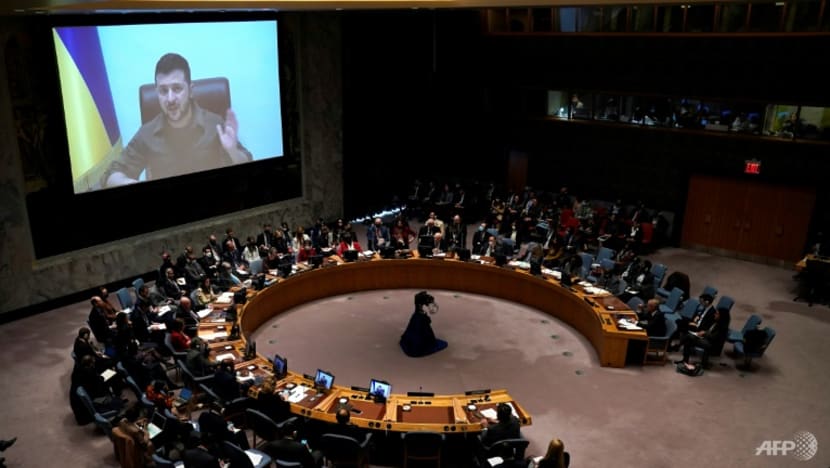FAQ: What can the UN do to help Ukraine and how can it act against Russia?
Can the United Nations Security Council stop Russia from vetoing its decisions with regard to Ukraine? What can the UN do to help citizens of Ukraine? CNA's Liling Tan, who has covered the UN for 10 years, explains.

President Volodymyr Zelenskyy of Ukraine addresses a meeting of the United Nations Security Council in New York City on Apr 5, 2022. (Photo: AFP/Timothy A Clary)
In an impassioned address to the United Nations Security Council on Tuesday (Apr 5), Ukrainian President Volodymyr Zelenskyy urged the body to "act immediately" against Russia's invasion and aggression in his country or "dissolve yourself altogether".
He urged the council to expel Russia, which he said has been blocking decisions about "its own aggression, its own war".
"We are dealing with a state that is turning the veto of the United Nations Security Council into the right to die,” Zelenskyy said.
His appeal came on the heels of outrage over evidence of a massacre of civilians - allegedly by Russian troops - in the Ukrainian city of Bucha.
But what can the UN do to intervene? And what can it do against Russia, one of five permanent Security Council members? Here are answers to some frequently asked questions:
What can the UN do to end the Russia-Ukraine war?
The UN can condemn Russian aggression, blame Moscow for the dire humanitarian consequences and demand that Russia stops.
These have taken place through General Assembly resolutions. The assembly is the UN’s largest body comprising all 193 member countries.
The UN Secretary-General and his team can also broker diplomatic talks, mediate behind the scenes and incentivise Russia to end the war.
But as an organisation founded on the principles of multilateralism and diplomacy, the UN’s priority is to seek a political solution through discourse first, over the use of force.
It’s a lot of talk, yes, but the words of the UN Secretary-General carry the weight of the world’s top diplomat, and condemnation from the General Assembly carries the weight of nations.
But diplomacy hasn’t worked so far. Can the UN now force Russia to withdraw?
No. The UN cannot force Russia’s hand.
The United Nations is not a government. Its Secretary-General is neither president nor prime minister. And the General Assembly does not have legal authority over any sovereign country, even if that country violates the sovereignty of another.
This means the UN chief and the General Assembly cannot make Moscow do anything it does not want to do, or punish it for doing something it is not supposed to do.
The only UN body that has the power to take punitive action against Russia is the UN Security Council. This council of 15 members can legally slap sanctions on Russia, approve military intervention, as well as impose embargoes and asset freezes to persuade Russia to change course.
But it is unable to do all that now, simply because Russia is a permanent member of the Council, with the power to veto – or block – any action against itself, as it did in February.
So the only UN body that can exert real pressure on Russia to withdraw is deadlocked.
Why isn’t the UN sending troops into Ukraine to help them fight?
The UN does not have its own military or police force.
It has UN peacekeepers but their peacekeeping missions usually occur when there is some sort of a political process in place, and they largely involve the protection of civilians.
UN peacekeepers also cannot take sides in a conflict.
On top of that, the Security Council is the only body with the power to authorise peacekeepers, and Russia would likely block the move.
Missions can also only take place if and when all major parties to the conflict agree.
Then what can the UN do to help civilians?
The UN can seek emergency funding to help Ukrainians displaced by the war and the countries hosting refugees. It is estimated that the war in Ukraine has already forced more than 10 million people to flee from their homes.
It has already launched appeals for US$1.7 billion to help displaced civilians and provide emergency supplies like medicine, food and water to Ukraine and countries sheltering refugees.
What can the UN do about the Bucha killings and allegations of human rights violations?
The UN and its agencies can investigate the attacks to guide further action.
The UN Human Rights Council can establish a commission of inquiry into Russia’s aggression against Ukraine, which it has done.
The General Assembly can also vote to suspend Russia’s membership on the UN Human Rights Council, as it did with Libya.
Can the UN take Russia to court for violating international law?
Yes. The International Court of Justice (ICJ), which oversees disputes, has ordered Russia to immediately suspend its military operations in Ukraine.
But the ICJ does not have the power to enforce that order because it does not have a police force.
The UN can also refer allegations of Russian war crimes and crimes against humanity to the International Criminal Court, which it has done, and the ICC has opened an investigation.
But neither Russia nor Ukraine are signatories to the ICC, which complicates the case against Russia.
And even if ICC investigations lead to an arrest warrant for Putin, a trial can take years to play out, without guarantee of conviction.














